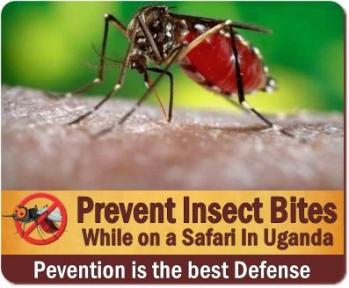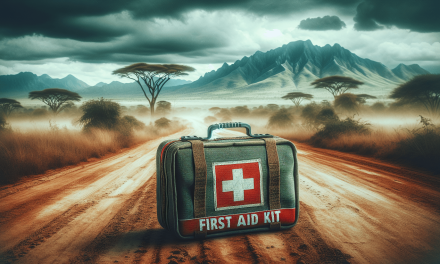If you’re planning a thrilling safari adventure in Africa, it’s essential to be prepared for the encounters you may have with insects. While the African landscape is teeming with fascinating wildlife, it’s also home to a vast array of bugs that can put a damper on your experience if you’re not careful. In this article, we’ll provide you with some handy tips on how to ensure a bug-free safari adventure, from packing the right insect repellent to choosing the most appropriate clothing for protection. So, get ready to embark on an unforgettable journey through the African wilderness, minus the unwelcome company of creepy crawlies. Africa is a beautiful continent known for its diverse wildlife and stunning landscapes. A safari adventure in Africa can be an unforgettable experience, but one thing that can put a damper on your trip is dealing with insects. Mosquitoes, ticks, and other pesky bugs can be a nuisance and even pose a health risk. To ensure a bug-free safari adventure, here are some helpful tips to follow.
Choose the Right Season
When planning your safari adventure, it’s important to research the peak insect season in the region you plan to visit. Insects tend to be more active during certain times of the year, so choosing the right season can make a big difference. If possible, opt for the dry season when insect activity is minimal. This will not only reduce the chances of encountering pesky bugs but also make your overall experience more enjoyable.
Pack Protective Clothing
To prevent insect bites, it’s essential to pack the right clothing. Long-sleeved shirts and long pants are highly recommended, as they provide a physical barrier between you and the insects. Additionally, wearing socks and closed-toe shoes can protect your feet from insect bites. It’s important to choose lightweight and breathable fabrics to stay comfortable in the African heat while still keeping the bugs at bay.

Use Insect Repellent
One of the most effective ways to keep insects at bay is by using insect repellent. Look for a mosquito repellent that contains at least 20% DEET and apply it to exposed skin. Be sure to follow the instructions on the product label and reapply the repellent every few hours or as directed. Insect repellents work by making it difficult for insects to detect and land on your skin, reducing the chances of being bitten.
Sleep Under a Mosquito Net
Mosquito nets are an essential item to pack for your safari adventure. When choosing accommodations, opt for those that provide mosquito nets over beds. These nets act as a physical barrier and prevent mosquitoes from reaching you while you sleep. Ensure that the net is properly tucked in and free from any holes to ensure maximum protection. Sleeping under a mosquito net will give you peace of mind and allow you to have a restful night’s sleep without the annoyance of buzzing mosquitoes.

Avoid Bright Colors and Strong Fragrances
Insects are often attracted to bright colors and strong scents. To avoid drawing unwanted attention from bugs, it’s best to opt for neutral-colored clothing. Lighter colors also help to reflect the sun’s rays, keeping you cooler in the African heat. Additionally, be mindful of the fragrances you use. Strong perfumes, scented lotions, and even certain shampoos can attract insects. Stick to fragrance-free products to minimize the chances of being bitten.
Keep Doors and Windows Closed
When indoors, it’s crucial to keep doors and windows closed to prevent insects from entering. Make sure to check for any gaps or openings that bugs could use as an entry point. If you need ventilation, consider using screens or netting on windows or doors. This will allow fresh air to circulate while keeping insects out. Being vigilant about keeping doors and windows closed will help create a bug-free environment inside your accommodations.

Avoid Standing Water
Insects, especially mosquitoes, breed in stagnant water. To minimize the presence of mosquitoes and other bugs, avoid areas with standing water such as puddles or uncovered water containers. Empty any containers that may collect water, such as buckets or flower pots. If you’re staying near a body of water, such as a lake or river, try to choose accommodations that are situated away from the water’s edge to reduce the risk of encountering insects.
Stay Away from Bushes and Tall Grass
When exploring the African wilderness, it’s important to be mindful of your surroundings. Insects, including ticks and spiders, often hide in bushes and tall grass. To avoid bites or stings, stick to clear paths and avoid walking through dense vegetation. Be cautious when venturing off-road or going on bushwalks. It’s a good idea to wear long pants and closed-toe shoes to provide additional protection against insects that may be lurking in the grass.

Be Mindful of Food Storage
Insects can be attracted to uncovered food or crumbs, so it’s essential to be mindful of how you store your food. When on safari, always store food securely in sealed containers to prevent insect infestation. Make sure to clean up any food spills or crumbs promptly and dispose of them properly. It’s also a good idea to keep your accommodations clean and free from food debris to minimize the chances of attracting insects.
Get Vaccinated
Lastly, it’s important to consult with a travel health professional about recommended vaccines for the region you plan to visit. Some vaccinations can help protect against insect-borne diseases such as malaria or yellow fever. Make sure to schedule an appointment well in advance of your trip to ensure you have enough time to complete any required courses of medication. Getting vaccinated is an important step in ensuring your health and well-being during your bug-free safari adventure.
In conclusion, with the right precautions, you can have a bug-free safari adventure in Africa. By choosing the right season, packing protective clothing, using insect repellent, sleeping under a mosquito net, avoiding bright colors and strong fragrances, keeping doors and windows closed, avoiding standing water and bushes, being mindful of food storage, and getting vaccinated, you can minimize the risk of encountering insects and focus on enjoying the breathtaking beauty of the African wildlife and landscapes. So, prepare yourself accordingly, follow these tips, and get ready for a bug-free safari adventure of a lifetime!













